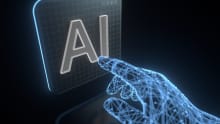5 technology predictions for the post-COVID-19 era

Academics and business gurus are desperately analyzing what has happened over the first few months of the COVID-19 pandemic, seeking to discover “the magic answer” - what we should do to succeed in the future. They have collected vast arrays of data, analyzed them, and derived predictions. And, guess what! Many have concluded that (a) more people will work from home, (b) the nature of business interactions and processes will change, (c) we will become more technology dependent, (d) businesses will become more dispersed, and (e) the center of cities will evolve. Did it really take an army of PhD’s to work that out? And, is that even helpful?
Many of the predictions based on analysis of the past completely miss the point. I love the quotation, often attributed (probably incorrectly) to Henry Ford, “If I had built my company based on research and analysis, I would have bred huge fast horses.”
Those who are highly successful don’t spend their time trying to predict the future merely by extrapolating how the past was handled. Instead they recognize that all substantial change arises out of either crises or someone’s crazy imagination of a step change. They then prepare themselves to handle those situations and create their own future. Indeed, the organizations who are performing best in the current crisis are those that (a) invested in excellent management and leadership skills, (b) listened to the news and realized that some crisis or other was inevitable, (c) structured their organizations, their processes, and their funding to be resilient to a crisis, and (d) used scenario planning to develop their staff to manage a crisis, any crisis!
Many currently strong organizations already had remote working in place, had been using collaboration technology for nearly a decade; had appointed people into management who wanted to be managers and had the skills to succeed; had developed agile and innovative processes; and constantly reviewed the power of contemporary technology, and deployed it to maximum effect. So, what next?
My contention is that mediocre companies will continue to chase the pack or so-called “best practices.” They will build hybrid organizations with essential face-to-face roles in fixed locations but many more workers performing from home or locations of their choice. They will assume that remote working, as currently understood, is here to stay and will invest in the now common meeting and collaboration technologies.
I also contend that they will pay the price in the longer term for the impact of those decisions. Cognitive and emotional distance combined with the tiredness, that remote working appears to trigger, will lead to further declines in already unacceptably low levels of employee engagement and productivity. The current uptick in management connectivity with their staff will decline as the novelty decreases and pressures for cost savings and increased sales rise exponentially. Remote working also creates challenges for managers in terms of monitoring and assessing individual performance, especially in terms of how the work is done and the skill development of remote staff. So, decisions about development, promotion, and reward will become increasingly difficult and flawed.
Organizations that will be most successful in the future will be those that take away this major learning from COVID-19 - out of the four characteristics of our current era (Volatile, Uncertain, Complex, and Ambiguous), Volatility and Uncertainty potentially cause the greatest damage ...and offer the biggest opportunities
However, I believe organizations that will be most successful in the future will be those that take away the major learning from COVID-19 – out of the four characteristics of our current era (Volatile, Uncertain, Complex, and Ambiguous), Volatility and Uncertainty potentially cause the greatest damage … and offer the biggest opportunities.
So, in that context, here are my technology predictions following COVID-19.
- We now know that virtual collaboration tools do not create the strength of relationships, emotional connections, or empathetic responses that physical face-to-face connections do. There are many theories including a hypothesis that current cameras and screens do not sufficiently convey the micro movements in the eyes, face, and body which we unconsciously detect and interpret. Someone, somewhere will fix that!
- We know that current collaboration tools provide for substandard interactions. When on a video conference, if you look at the picture of the person to whom you are speaking, you cannot be looking at your camera. Hence, the other person does not feel that you are speaking to them. Someone, somewhere will fix that. They will develop a screen that has a virtual camera embedded in it and which continually moves to the spot on the screen where it detects your eyes are looking.
- We know that it is challenging and often ineffective to have those difficult conversations with others, perhaps over performance, perhaps over a difference of opinion, perhaps over an emotional issue. Someone, somewhere will fix that! We no longer view speech recognition software as the amazing mystery that it was only a few years ago. Well, AI will be used to analyze (a) facial expressions, (b) semantic use of words and language structure, (c) changes in voice speed, tonality and volume, and (d) timing and sequencing of interactions to identify an individual’s emotional state, communication preferences and intentions, and even their level of honesty. All of this will then be presented to the other person in a visual form along with recommendations on how to respond.
- Managers have always struggled to monitor and assess individual performance in all bar the most simple and repetitive of tasks. But even the most obvious of those e.g., “sales” prove challenging. For example, if a sales person has a target of $1m per annum and hits $900,000, have they “Not met expectations”? What if halfway through that year, a completely unexpected new competitor entered the market, with quality product at 75 percent of your price. Is that the fault of the sales person? Of course not. But monitoring and assessing, “Did the sales person do everything that they reasonably could have done to detect the new entrant early, to collect intelligence for us to work with, to build strong relationships with current customers, …..?” are really the performance questions which most managers can neither track nor objectively assess. Someone, somewhere will fix that! AI will eventually be used to (a) collect data on activities, decisions, and even individual behaviors (e.g., through wearable devices or sensors), (b) integrate and analyze that data, and (c) determine both assessments of holistic performance and potential performance improvements for each individual.
- We know that current recruitment decisions are seriously questionable in terms of validity and reliability. Someone, somewhere will fix that! AI will eventually be used as in 4. above to take recruitment decisions out of the hands on managers or HR. Algorithms will be developed to analyze and debias data collected from a wide range of sources including social media and crowd-sourced assessments of interview videos. These will produce recruitment and promotion decisions.
Those who are highly successful don't spend their time trying to predict the future merely by extrapolating how the past was handled. Instead they recognize that all substantial change arises out of either crises or someone's crazy imagination of a step change.
COVID-19 has been a wake-up call for the world, countries, organizations, and individuals. We now understand that crises happen and they will happen in the future. It has triggered previously unimaginable uses of technology in all walks of life. This could lead to one of the most existing, potentially scary, phases of HR technology evolution. You heard it here first! So, watch this space.

















